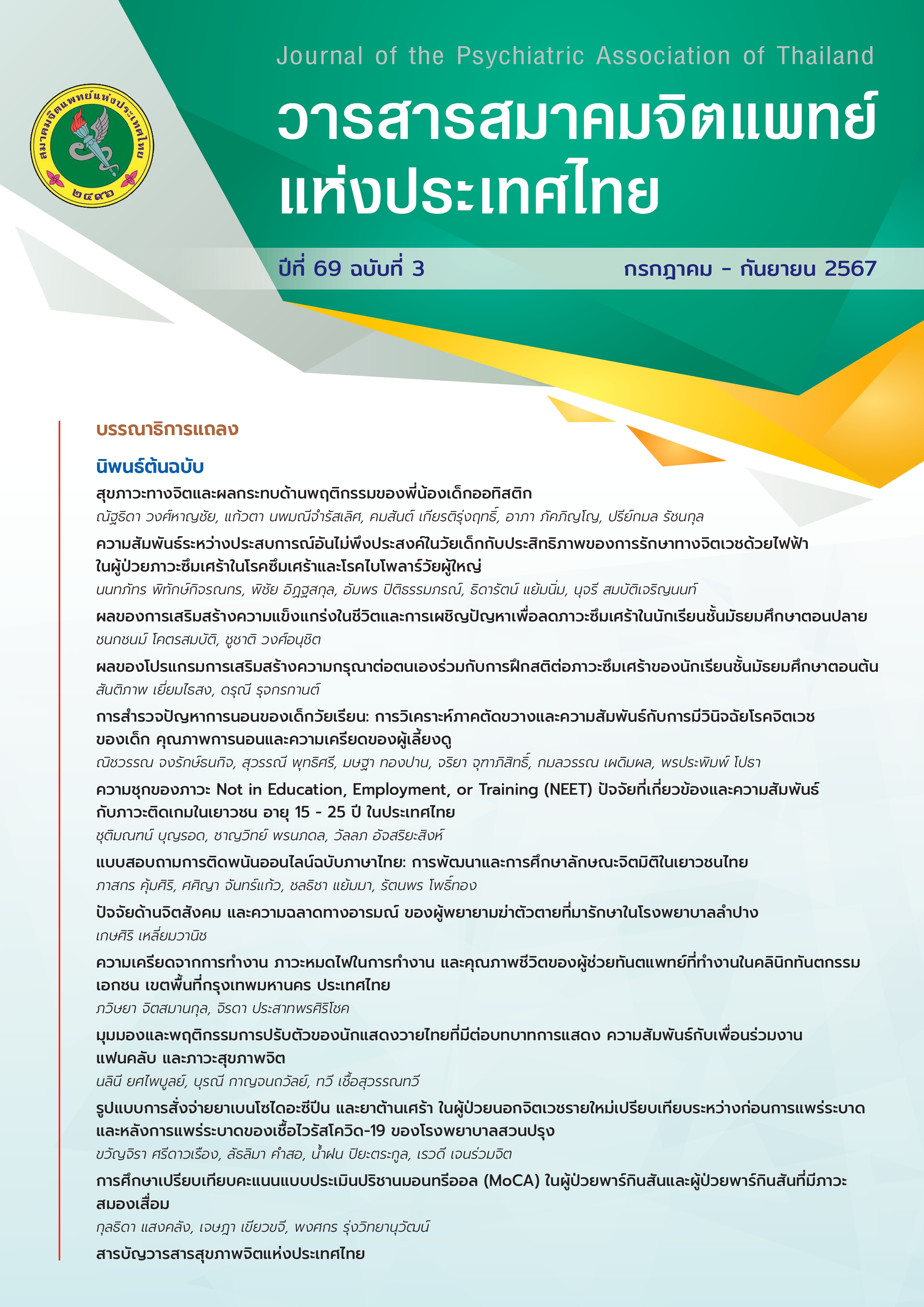การสำรวจปัญหาการนอนของเด็กวัยเรียน: การวิเคราะห์ภาคตัดขวางและความสัมพันธ์กับการมีวินิจฉัยโรคจิตเวชของเด็ก คุณภาพการนอนและความเครียดของผู้เลี้ยงดู
Main Article Content
บทคัดย่อ
วัตถุประสงค์ เพื่อศึกษาความแตกต่างของปัญหาการนอนระหว่างเด็กวัยเรียนที่มีโรคจิตเวชและกลุ่มควบคุม และเพื่อศึกษาความสัมพันธ์ระหว่างปัญหาการนอนหลับในเด็กวัยเรียนกับการมีวินิจฉัยโรคจิตเวช รวมถึงคุณภาพการนอนและความเครียดของผู้เลี้ยงดู
วิธีการศึกษา การวิจัยนี้ใช้การสํารวจแบบภาคตัดขวาง (cross-sectional study) โดยทำการเก็บข้อมูลในเด็กไทย อายุ 6 - 10 ปี ที่ได้รับการวินิจฉัยโรคทางจิตเวชเปรียบเทียบกับกลุ่มควบคุมซึ่งเป็นนักเรียนชั้นประถมศึกษาปีที่ 1 - 4 จากโรงเรียนรัฐบาล สำหรับปัญหาการนอนในเด็กนั้นจะใช้แบบสอบถามปัญหาการนอนในเด็กฉบับภาษาไทย (the Children’s Sleep Habits Questionnaire (CSHQ) - Thai version) และใช้แบบสอบถามคุณภาพการนอนหลับของพิทส์เบิร์กฉบับแปลภาษาไทย (The Pittsburgh Sleep Quality Index (PSQI) – Thai version) และใช้แบบวัดความรู้สึกเครียด (Thai Perceived Stress Scale-10 (T-PSS-10)) เพื่อประเมินปัญหาการนอนและความเครียดของผู้เลี้ยงดู จากนั้นจะนำข้อมูลที่ได้มาวิเคราะห์โดยใช้การถดถอยโลจิสติก (Binary logistic regression) เพื่อหาปัจจัยที่มีความสัมพันธ์ต่อปัญหาการนอนในเด็กและหาความสัมพันธ์ระหว่างปัญหาการนอนหลับในเด็กและใช้การวิเคราะห์สมการถดถอยพหุคูณแบบเป็นขั้นตอน (stepwise multiple regression analysis) เพื่อหาปัจจัยที่มีความสัมพันธ์ต่อคะแนนรวมของ CSHQ
ผลการศึกษา มีผู้เข้าร่วมในการศึกษาทั้งหมด 202 คน ประกอบด้วยเด็กที่มีโรคทางจิตเวชจำนวน 87 คน และเด็กในกลุ่มควบคุมจำนวน 115 คน โดยเด็กในกลุ่มที่มีโรคทางจิตเวชจะมีค่าเฉลี่ยของคะแนนรวมของ CSHQ สูงกว่า เมื่อเปรียบเทียบกับกลุ่มควบคุม (49.99 และ 47.82) และในกลุ่มเด็กที่มีโรคทางจิตเวชจะพบร้อยละของเด็กที่มีปัญหาการนอนมากกว่าในกลุ่มควบคุมอย่างมีนัยสำคัญ (57.47% และ 45.22%) สำหรับปัจจัยที่มีความสัมพันธ์แบบมีนัยสำคัญทางสถิติกับปัญหาการนอนของเด็ก ได้แก่ การมีวินิจฉัยโรคจิตเวช การใช้ยา ปัญหาการนอนหลับและความเครียดของผู้เลี้ยงดู อย่างไรก็ตามเมื่อทำการวิเคราะห์สมการถดถอยพหุคูณแบบเป็นขั้นตอนพบว่า ตัวแปรที่มีผลต่อคะแนนรวมของ CSHQ อย่างมีนัยสำคัญทางสถิติคือการมีวินิจฉัยโรคจิตเวช ดื่มเครื่องดื่มที่มีส่วนประกอบของคาเฟอีนหลัง 5 โมงเย็น คะแนนความเครียดของผู้เลี้ยงดู และรายได้ต่อเดือนของผู้เลี้ยงดู
สรุป เด็กที่มีวินิจฉัยโรคจิตเวชจะมีความเสี่ยงสูงที่จะเกิดปัญหาการนอน แต่อย่างไรก็ตามปัจจัยอื่นๆ เช่น การดื่มเครื่องดื่มคาเฟอีน ความเครียดของผู้เลี้ยงดู และรายได้ต่อเดือนของผู้เลี้ยงดูก็มีผลต่อปัญหาการนอนของเด็กเช่นเดียวกัน ดังนั้นจึงควรค้นหาและรักษาปัญหาการนอนในเด็กทุกคนโดยเร็ว ควบคู่ไปกับการส่งเสริมสุขอนามัยการนอนที่ดี และการจัดการความเครียดทั้งในเด็กและผู้เลี้ยงดูก็มีความสำคัญ เพื่อให้เกิดสุขภาวะที่ดีอย่างเป็นภาพรวม
Article Details

อนุญาตภายใต้เงื่อนไข Creative Commons Attribution-NonCommercial-NoDerivatives 4.0 International License.
บทความที่ส่งมาเพื่อพิจารณา ต้องไม่เคยตีพิมพ์หรือได้รับการตอบรับให้ตีพิมพ์ในวารสารฉบับอื่น และต้องไม่อยู่ระหว่างการส่งไปพิจารณาในวารสารอื่น
เอกสารอ้างอิง
Jiang F. Sleep and early brain development. Ann Nutr Metab 2019;75 (Suppl 1):44-54.
Beebe DW. Cognitive, behavioral, and functional consequences of inadequate sleep in children and adolescents. Pediatr Clin North Am 2011;58(3):649-65.
Turnbull K, Reid GJ, Morton JB. Behavioral sleep problems and their potential impact on developing executive function in children. Sleep 2013;36(7):1077-84.
Hysing M, Sivertsen B, Garthus-Niegel S, Eberhard-Gran M. Pediatric sleep problems and social-emotional problems. A population-based study. Infant Behav Dev 2016;42:111-8.
Mindell JA, Leichman ES, DuMond C, Sadeh A. Sleep and social-emotional development in infants and toddlers. J Clin Child Adolesc Psychol 2017;46(2):236-46.
El Halal CDS, Nunes ML. Sleep and weight-height development. J Pediatr (Rio J) 2019;95(Suppl 1):2-9.
Chen X, Beydoun MA, Wang Y. Is sleep duration associated with childhood obesity? A systematic review and meta-analysis. Obesity (Silver Spring) 2008;16(2):265-74.
Mindell JA, Williamson AA. Benefits of a bedtime routine in young children: Sleep, development, and beyond. Sleep Med Rev 2018;40:93-108.
Sirirassamee F, Chonchaiya W, Pruksananonda C. Sleep behaviors and sleep problems in school-aged children in Thailand. J Med Assoc Thai 2015;98 (Suppl 9):S71-7.
Mindell JA, Sadeh A, Kwon R, Goh DY. Cross-cultural differences in the sleep of preschool children [published correction appears in Sleep Med 2014 Dec;15(12):1595-6]. Sleep Med 2013;14(12):1283-9.
Combs D, Goodwin JL, Quan SF, Morgan WJ, Shetty S, Parthasarathy S. Insomnia, health-related quality of life and health outcomes in children: a seven year longitudinal cohort. Sci Rep 2016;6:27921.
Sateia MJ. International classification of sleep disorders-third edition: highlights and modifications. Chest 2014;146(5):1387-94.
Kerr S, Jowett S. Sleep problems in pre-school children: a review of the literature. Child Care Health Dev 1994;20(6):379-91.
Richdale AL, Schreck KA. Sleep problems in autism spectrum disorders: prevalence, nature, & possible biopsychosocial aetiologies. Sleep Med Rev 2009;13(6):403-11.
Singh K, Zimmerman AW. Sleep in autism spectrum disorder and attention deficit hyperactivity disorder. Semin Pediatr Neurol 2015;22(2):113-25.
Alfano CA, Gamble AL. The role of sleep in childhood psychiatric disorders. Child Youth Care Forum 2009;38(6):327-40.
Asarnow LD, Mirchandaney R. Sleep and mood disorders among youth. Child Adolesc Psychiatr Clin N Am 2021;30(1):251-68.
Lorterapong P, Putthisri S, Osathanond W. Sleep disturbances and associated factors in Thai children with autism spectrum disorder. J Psychiatr Assoc Thailand 2019; 64(2):149-62.
Kaewwan A, Narkpongpan A. The relationship between sleep habits and behavioral problems in children with autism spectrum disorder at Maharaj Nakorn Chiang Mai Hospital. APPJ 2017;33(3):189-206.
Hosiri T, Punyapas S, Sawangsri W. The prevalence and patterns of sleep problem in children with ADHD. J Med Assoc Thai 2018;101(1):S34-40.
Chiraphadhanakul K, Jaimchariyatam N, Pruksananonda C, Chonchaiya W. Increased sleep disturbances in Thai children with attention-deficit hyperactivity disorder compared with typically developing children. Behav Sleep Med 2016;14(6):677-86.
Meltzer LJ, Mindell JA. Relationship between child sleep disturbances and maternal sleep, mood, and parenting stress: a pilot study. J Fam Psychol 2007;21(1):67-73.
Varma P, Conduit R, Junge M, Jackson ML. Examining sleep and mood in parents of children with sleep disturbances. Nat Sci Sleep 2020;12:865-74.
Sadeh A, Tikotzky L, Scher A. Parenting and infant sleep. Sleep Med Rev 2010;14(2):89-96.
McQuillan ME, Bates JE, Staples AD, Deater-Deckard K. Maternal stress, sleep, and parenting. J Fam Psychol 2019;33(3):349-59.
Martin CA, Papadopoulos N, Chellew T, Rinehart NJ, Sciberras E. Associations between parenting stress, parent mental health and child sleep problems for children with ADHD and ASD: Systematic review. Res Dev Disabil 2019;93:103463.
Lewien C, Genuneit J, Meigen C, Kiess W, Poulain T. Sleep-related difficulties in healthy children and adolescents. BMC pediatrics 2021;21:1-1.
Bayes DM, Bullock B. Sleep problems in school aged children: a common process across internalising and externalising behaviours?. Clocks & Sleep 2019;2(1):7-18.
Muhe Aldeen AL, Ibrahim RH. Prevalence of sleep disorders among children in elementary schools in Kirkuk City. MJN 2015;3(1):14-8.
Paavonen J. Sleep disturbances and psychiatric symptoms in school-aged children [dissertation]. University of Helsinki; 2004.
Owens JA, Spirito A, McGuinn M. The Children's Sleep Habits Questionnaire (CSHQ): psychometric properties of a survey instrument for school-aged children. Sleep 2000;23(8):1043-51.
Disayawanwat P, Pityaratstian N. Development of Children’s Sleep Habit Questionnaire Thai version. Chula Med J 2016;60(3): 297 – 312.
Ishii R, Obara H, Nagamitsu S, et al. The Japanese version of the children's sleep habits questionnaire (CSHQ-J): A validation study and influencing factors. Brain Dev 2022;44(9):595-604.
Sitasuwan T, Bussaratid S, Ruttanaumpawan P, Chotinaiwattarakul W. Reliability and validity of the Thai version of the Pittsburgh Sleep Quality Index. J Med Assoc Thai 2014;97 (Suppl 3):S57-S67.
Cohen S, Kamarck T, Mermelstein R. A global measure of perceived stress. J Health Soc Behav 1983;24(4):385-96.
Perceived Stress Scale [Internet]. New Hampshire: State of New Hampshire Employee Assistance Program. Available from: https://www.das.nh.gov/wellness/docs/percieved%20stress%20scale.pdf. Accessed March 10, 2023.
Wongpakaran N, Wongpakaran T. The Thai version of the PSS-10: An Investigation of its psychometric properties. Biopsychosoc Med 2010;4:6.
Ramtekkar U, Ivanenko A. Sleep in children with psychiatric disorders. Semin Pediatr Neurol 2015;22(2):148-55.
Ivanenko A, Crabtree VM, Obrien LM, Gozal D. Sleep complaints and psychiatric symptoms in children evaluated at a pediatric mental health clinic. J Clin Sleep Med 2006;2(1):42-8.
Ivanenko A, Johnson K. Sleep disturbances in children with psychiatric disorders. Semin Pediatr Neurol 2008;15(2):70-8.
Inthikoot N, Chonchaiya W. Sleep problems in children with autism spectrum disorder and typical development. Pediatr Int 2021;63(6):649-57.
Shen C, Luo Q, Chamberlain SR, et al. What is the link between attention-deficit/hyperactivity disorder and sleep disturbance? a multimodal examination of longitudinal relationships and brain structure using large-scale population-based cohorts. Biol Psychiatry 2020;88(6):459-69.
Kirov R, Brand S. Sleep problems and their effect in ADHD. Expert Rev Neurother 2014;14(3):287-99.
Cortese S, Faraone SV, Konofal E, Lecendreux M. Sleep in children with attention-deficit/hyperactivity disorder: meta-analysis of subjective and objective studies. J Am Acad Child Adolesc Psychiatry 2009;48(9):894-908.
Clark I, Landolt HP. Coffee, caffeine, and sleep: A systematic review of epidemiological studies and randomized controlled trials. Sleep Med Rev 2017;31:70-8.
Watson EJ, Banks S, Coates AM, Kohler MJ. The relationship between caffeine, sleep, and behavior in children. J Clin Sleep Med 2017;13(4):533-43.
Snel J, Lorist MM. Effects of caffeine on sleep and cognition. Prog Brain Res 2011;190:105-17.
Turner S, Ali A, Wham C, Rutherfurd-Markwick K. Secondary school students and caffeine: consumption habits, motivations, and experiences. Nutrients 2023;15(4):1011.
Fadzil A. Factors affecting the quality of sleep in children. Children (Basel) 2021;8(2):122.
Paruthi S, Brooks LJ, D'Ambrosio C, et al. Recommended amount of sleep for pediatric populations: A Consensus Statement of the American Academy of Sleep Medicine. J Clin Sleep Med 2016;12(6):785-6.
Lee J, Spratling R, Helvig A. Sleep characteristics in mothers of children with developmental disabilities. J Pediatr Health Care 2018;32(1):e9-e18.
Mannion A, Leader G. Relationship between child sleep problems in autism spectrum disorder and parent mental health and well-being. Sleep Med 2023;109:4-10.
Meltzer LJ. Brief report: sleep in parents of children with autism spectrum disorders. J Pediatr Psychol 2008;33(4):380-6.
Meltzer LJ, Montgomery-Downs HE. Sleep in the family. Pediatr Clin North Am 2011;58(3):765-74.
Varma P, Conduit R, Junge M, Lee VV, Jackson ML. A systematic review of sleep associations in parents and children. J Child Fam Stud 2021;30(9):2276-88.
Rönnlund H, Elovainio M, Virtanen I, Matomäki J, Lapinleimu H. Poor Parental Sleep and the Reported Sleep Quality of Their Children. Pediatrics 2016;137(4):e20153425.
Merrill RM, Slavik KR. Relating parental stress with sleep disorders in parents and children. PLoS One 2023;18(1):e0279476.
Mannion A, Leader G. Relationship between child sleep problems in autism spectrum disorder and parent mental health and well-being. Sleep Med 2023;109:4-10.
Roustit C, Campoy E, Chaix B, Chauvin P. Exploring mediating factors in the association between parental psychological distress and psychosocial maladjustment in adolescence. Eur Child Adolesc Psychiatry 2010;19:597-604.
Chardon ML, Stromberg SE, Lawless C, Fedele DA, Carmody JK, Dumont-Driscoll MC, et al. The role of child and adolescent adjustment problems and sleep disturbance in parent psychological distress. J Clin Child Adolesc Psycho 2018;47(3):374-81.
Mikolajczak M, Brianda ME, Avalosse H, Roskam I. Consequences of parental burnout: Its specific effect on child neglect and violence. Child abuse & neglect 2018;80:134-45.
Cameron EE, Watts D, Silang K, Dhillon A, Sohal PR, MacKinnon AL, et al. Parental socioeconomic status and childhood sleep: A systematic review and meta-analysis. Sleep Epidemiology 2022;2:100047.
McDowall PS, Elder DE, Campbell AJ. Relationship between parent knowledge of child sleep, and child sleep practices and problems: a pilot study in a children's hospital cohort. J Paediatr Child Health 2017;53(8):788-93.
Ordway MR, Sadler LS, Jeon S, O'Connell M, Banasiak N, Fenick AM, et al. Sleep health in young children living with socioeconomic adversity. Res Nurs Health 2020;43(4):329-40.
McDowall PS, Galland BC, Campbell AJ, Elder DE. Parent knowledge of children's sleep: A systematic review. Sleep Med Rev 2017;31:39-47
Doane LD, Breitenstein RS, Beekman C, Clifford S, Smith TJ, Lemery-Chalfant K. Early life socioeconomic disparities in children’s sleep: the mediating role of the current home environment. J Youth Adolesc 2019;48:56-70.
Bagley EJ, Kelly RJ, Buckhalt JA, El-Sheikh M. What keeps low-SES children from sleeping well: the role of presleep worries and sleep environment. Sleep Med 2015;16(4):496-502.
Philbrook LE, Saini EK, Fuller-Rowell TE, Buckhalt JA, El-Sheikh M. Socioeconomic status and sleep in adolescence: The role of family chaos. J Fam Psychol 2020;34(5):577.
Covington LB, Rogers VE, Armstrong B, Storr CL, Black MM. Toddler bedtime routines and associations with nighttime sleep duration and maternal and household factors. J Clin Sleep Med 2019;15(6):865-71.


